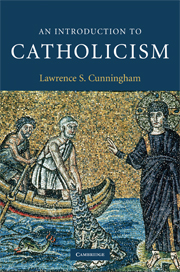Book contents
- Frontmatter
- Contents
- Illustrations
- Preface
- Acknowledgments
- 1 The many meanings of Catholicism
- 2 Roman Catholicism
- 3 Being Catholic: Some typologies
- 4 Catholicism in place and time
- 5 Catholic worship
- 6 The rule of faith
- 7 Catholic spirituality
- 8 The missionary character of Catholicism
- 9 Catholic reformation(s)
- 10 The moral life
- 11 The contemporary Catholic Church
- 12 Reading Catholicism: Bibliographical resources
- Index
- References
10 - The moral life
Published online by Cambridge University Press: 05 June 2012
- Frontmatter
- Contents
- Illustrations
- Preface
- Acknowledgments
- 1 The many meanings of Catholicism
- 2 Roman Catholicism
- 3 Being Catholic: Some typologies
- 4 Catholicism in place and time
- 5 Catholic worship
- 6 The rule of faith
- 7 Catholic spirituality
- 8 The missionary character of Catholicism
- 9 Catholic reformation(s)
- 10 The moral life
- 11 The contemporary Catholic Church
- 12 Reading Catholicism: Bibliographical resources
- Index
- References
Summary
INTRODUCTION
As a long-time university professor of theology, I have found that it is not infrequently the case that students will express their unhappiness with religion in general or express resistance to the required courses in theology demanded of all undergraduates at our university, because, they aver, it is so preoccupied with “You shall” and “You shall not.” In the thinking of these young critics, Catholic Christianity is too concerned with rules and regulations concerning moral behavior. There is no doubt that Catholicism does preach a moral code, but what is not often emphasized is that the moral or ethical life, according to Catholic teaching, flows out of faith, which is to say that Christian morality derives its strength from the prior conversion of a person to the Way of Jesus. The “shall” and the “shall not” are subsequent to the embrace of faith itself.
According to a dictum attributed to Saint Augustine of Hippo, the correct relationship between faith and morality is this: “Love God and do what you please.” That aphorism assumes that a right relationship with God will lead, inevitably, to a moral way of being. Cardinal John Henry Newman caught this truth perfectly when, in a sermon, he said this: “You need not attempt to draw any precise line between what is sinful and what is only allowable: Look up to Christ, and deny yourself everything, whatever its character, which you think He would have you relinquish.
- Type
- Chapter
- Information
- An Introduction to Catholicism , pp. 219 - 240Publisher: Cambridge University PressPrint publication year: 2009

